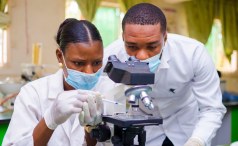
Our world and everything in it is made up of innumerable tiny molecules. These molecules are the smallest units of chemical compounds or living things. Viruses, bacteria, parasites, plants, animals, humans: each organism is underpinned by molecules. Studying them allows scientists to understand the basic principles and interactions that govern all forms of life, writes Chinwe Uzoma Chukwudi for The Conversation.
Molecular research could also, in the future, make it possible to personalise medicine – basing treatment on a patient’s DNA. And it may be key to progress in the treatment of diseases such as sickle cell anemia, diabetes, and cancer. Molecular research is expensive, but worth it because of the burden of disease that it could relieve.
According to Chukwudi, in Nigeria, and in many other African countries – there is very little state funding for research and development. Nigeria’s TETFund, the government agency responsible for all higher education funding, has very limited resources. Molecular research is often neglected in funding decisions in favour of other forms of research that could provide immediate solutions to pressing societal needs, such as immediate control measures for disease outbreaks.
South Africa has demonstrated this dedicated research support via its National Research Foundation. Huge funds have been invested in research for the control of HIV and Aids and, more recently, Covid-19.
There is a strong need for national and international funding bodies to increase funding allocations to improve molecular research capacity in Africa. Also, universities and research institutions should provide an enabling environment by providing easy access to the equipment and facilities that researchers need. Researchers will thus be encouraged to find solutions to health challenges and train more scientists.

